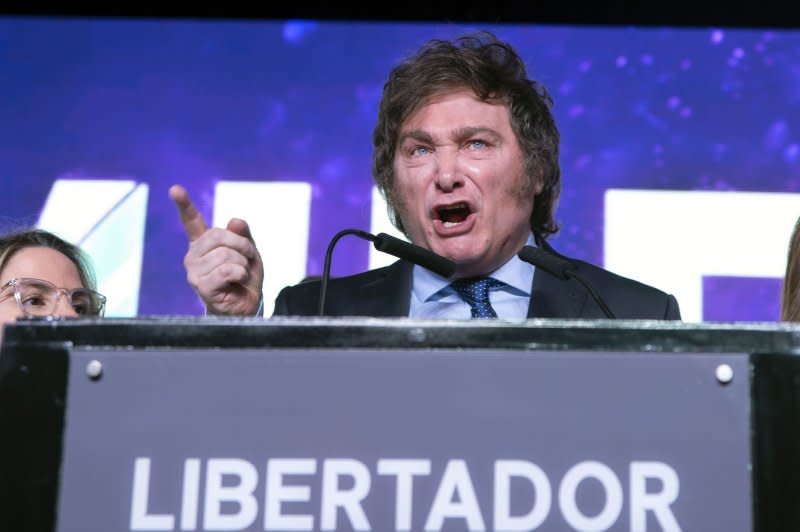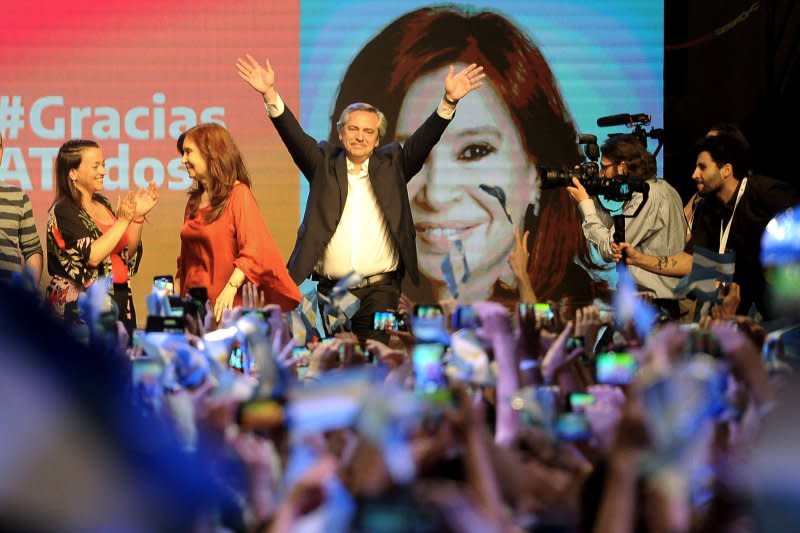Financial markets react to shock of far-right candidate's win in Argentina

Aug. 14 (UPI) -- Far-right opposition candidate Javier Milei claimed a surprise victory in Sunday's Argentine primary election for president after winning more than 30% of the vote.
The 52-year-old Milei, a libertarian economist who serves as national deputy for Buenos Aires and head of the La Libertad Avanza, played spoiler to nearly two dozen establishment candidates after polls showed his party running third place throughout the race.
Argentine markets reacted to the shock result on Monday by sliding sharply lower while the Central Bank of the Argentine Republic devalued the peso by 22% and increased the prime interest rate by 21 percentage points to 118% in an bid to calm financial turmoil and dissuade local investors to fleeing to the dollar.
Milei, whose hardline economic policy includes a framework to abolish the central bank in an effort to curtail rampant inflation currently running at more than 100%, said the results showed a yearning for "real" change.
"We have not only managed to establish ourselves individually, today we are the most-voted political force because we are the real opposition, the ones who want real change," Milei said in his victory speech at LLA campaign headquarters at the Libertador Hotel in Buenos Aires. "A different Argentina is impossible with the same old people, with the same people who have been failing for over a hundred years."

With more than 97% of votes counted, media outlets hailed Milei's victory as a "political earthquake."
The primary, which was not restricted to the major parties, featured 22 presidential candidates from all the national provincial districts, with Melei emerging as the favorite to win the presidential election on Oct. 22.
He will face centrist candidate Patricia Bullrich, chairwoman of the Juntos por el Cambio, who came in second place with 28% of the vote, and Economy Minister Sergio Massa, of the conservative ruling Unión por la Patria party, who placed third with roughly 27%.
Milei is his coalition's only candidate for president and has vowed to shake up status quo with his "chainsaw plan" for its sweeping cuts to the federal budget.
The "black swan" nature of his unexpected victory triggered a 10% plunge in the value of the peso as markets opened on Monday, prompting the central bank to intervene.
The move was made to "anchor exchange expectations" and to bolster the peso and Argentina's foreign currency reserves, bank officials said in a statement, adding that the official exchange rate will be fixed at 350 pesos to the U.S. dollar until the October elections.
Milei has said he would seek to shut down a swath of government agencies, eliminate social welfare programs, and roll back other progressive policies that work to protect the environment and minority rights, as well as various other initiatives that would be defunded under his administration.
"If we keep working with this passion, professionalism, and above all, love for the ideas of liberty, we're in a position to beat the caste in the first round," Milei said in his victory speech.
In July, federal prosecutor Ramiro González launched an investigation into Milei after former allies alleged his campaign had sold some positions on the ballot for tens of thousands of dollars.
Milei has denied any wrongdoing, and dismissed the charges as a "smear campaign."
He was also benefiting from a wave of nationwide discontent over inflation that has soared to 115% and as one in four Argentines was living in poverty.
Following the vote, Bullrich said she would unite with rival candidate Horacio Rodríguez Larreta to widen her appeal in the next vote.
Bullrich vowed to create "change that leaves corruption behind forever and opens the way to austerity. That leaves behind pillaging and care for the property and work of Argentines. A change that leaves behind education held prisoner to political disputes, and closes the doors of our children to their future."
Massa called on Argentines to seriously consider the future of the country.
"We will fight until the last minute because we are sure that in the upcoming Argentina work, production, the defense of our rights, and public education have to be ideals that don't change, regardless of who is in government," he said.
"This is the start of transcendent weeks in Argentina, where we will consider what kind of country we want for the upcoming years," the economy minister said. "We are starting to discuss if we will have indiscriminate imports, or defend the national industry. We will keep defending our small businesses, sovereign energy, and national development."
Bullrich and Massa, will try to make up some ground in the polls ahead of the first round of the presidential election in October. The top two finishers will face each other on Nov. 19 if no candidate reaches a threshold of 45% of vote.

 Yahoo Sports
Yahoo Sports 